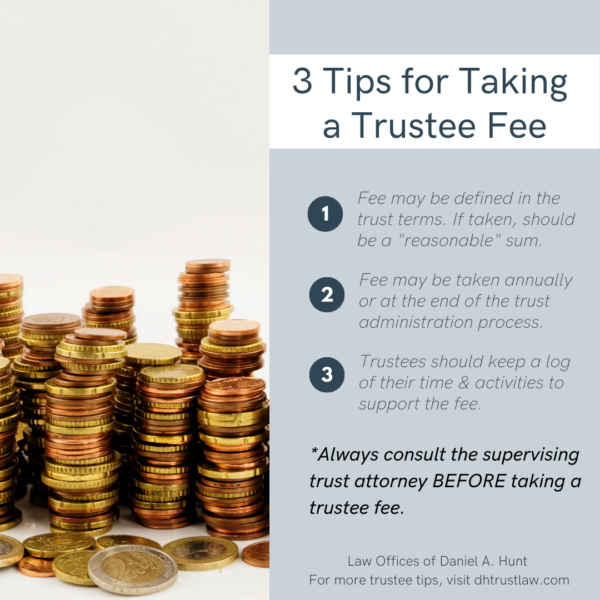How to Take a Trustee Fee in California

Serving as a trustee can be a time-intensive job. If you’re a Successor Trustee, you may be wondering if you will be compensated. Here are some tips on how and when to take a trustee’s fee in California.
What is a Trustee Fee?
A trustee fee is compensation available to the acting trustee for their efforts spent administering the trust. This fee is taken out of the available trust funds.
How Much is a Trustee Fee?
California Probate Code section 15680 states that if the trust document outlines rules for taking a trustee’s fee, these provisions should be followed. Exceptions may be made for “extraordinary circumstances”, such as an extremely complex trust administration that requires an inordinate amount of the trustee’s time. If the trust document doesn’t specify the amount of a trustee fee, California Probate Code 15681 states that a trustee is “entitled to reasonable compensation under the circumstances”.
Many trusts define an acceptable trustee fee as a percentage of the total trust assets. For example, the terms of the trust may state that the trustee is entitled to an annual fee of 1% of the total trust estate. So a trustee administering a $1 million estate could be compensated annually at $10,000.
Another common form of compensation is an hourly fee based on the trustee’s time. A reasonable hourly rate for a private trustee is often in the $25-35 per hour range. Trustees should keep a detailed log from the very beginning of all time spent doing trust-related activities, including the task completed and how long it took. Accurately reconstructing time logs can be very challenging. We recommend you start your time log at the beginning of the trust administration and continue until the administration concludes.
Be sure to include your travel time, emails, phone calls/texts, and other easily overlooked time entries. You should also be tracking your reimbursable trust-related expenses. Reimbursements are separate from your trustee fee and not considered taxable income.
Consult the Attorney First
We’ve seen trustees pay themselves fees that were three times what would be considered “reasonable,” simply because they didn’t know what they were doing. This brings us to a very important point: Always consult with the supervising trust attorney before taking a trustee fee. An experienced trust attorney can make sure the fee’s timing and amount are appropriate, preventing any possible breaches of your fiduciary duty and potential litigation.
When to Take a Trustee Fee
Depending on the circumstances, there are two options for the timing of taking a trustee fee. You can either take your fee annually at the end of the calendar year or take it in one lump sum at the end of the trust administration.
We generally recommend taking an annual fee. This strategy often has income tax advantages for the trustee. For longer trust administrations, the beneficiaries may also be less likely to object to several smaller fees over the years as opposed to one enormous fee at the very end of the administration process.
Please note that trust administrations should be completed in a time-efficient manner in keeping with your fiduciary duties. A trustee should never drag their feet on completing the work in order to continue collecting an annual fee. This mistake would leave you vulnerable to legal action by the beneficiaries and trust litigation.
Is Taking a Trustee Fee Mandatory?
Taking a trustee fee is not mandatory and may be waived if desired. This compensation is considered taxable income for the Trustee. Some trustees choose to waive their right to a fee in order to keep more funds in the trust and avoid unnecessary income tax. If you’re concerned about the potential tax consequences of taking a trustee fee, we recommend that you consult your CPA.
Can a Trustee Be Denied Compensation?
Probate Code 16420 states that if a trustee commits a breach of trust, or has an unreasonable delay in the administration process, the beneficiaries can pursue a court action to reduce or deny the trustee’s compensation. This is one reason it’s critically important to understand your duties as trustee and preferably administer a trust under the supervision of an experienced trust attorney.
Justifying a Trustee Fee
What if the beneficiaries don’t want you to take a trustee fee? It’s true: Beneficiaries don’t always relish the idea of a trustee cutting themself a check out of the trust funds, even if they are legally entitled to do so. They may view it as self-dealing and reducing their own inheritance. However, keeping a detailed log of your time and activities as trustee will provide beneficiaries with supporting evidence to justify the fee taken.
For more advice on how and when to take a trustee fee, or for other trust administration-related questions, feel free to contact our law firm.
Law Offices of Daniel A. Hunt
The Law Offices of Daniel A. Hunt is a California law firm specializing in Estate Planning; Trust Administration & Litigation; Probate; and Conservatorships. We've helped over 10,000 clients find peace of mind. We serve clients throughout the greater Sacramento region and the state of California.




